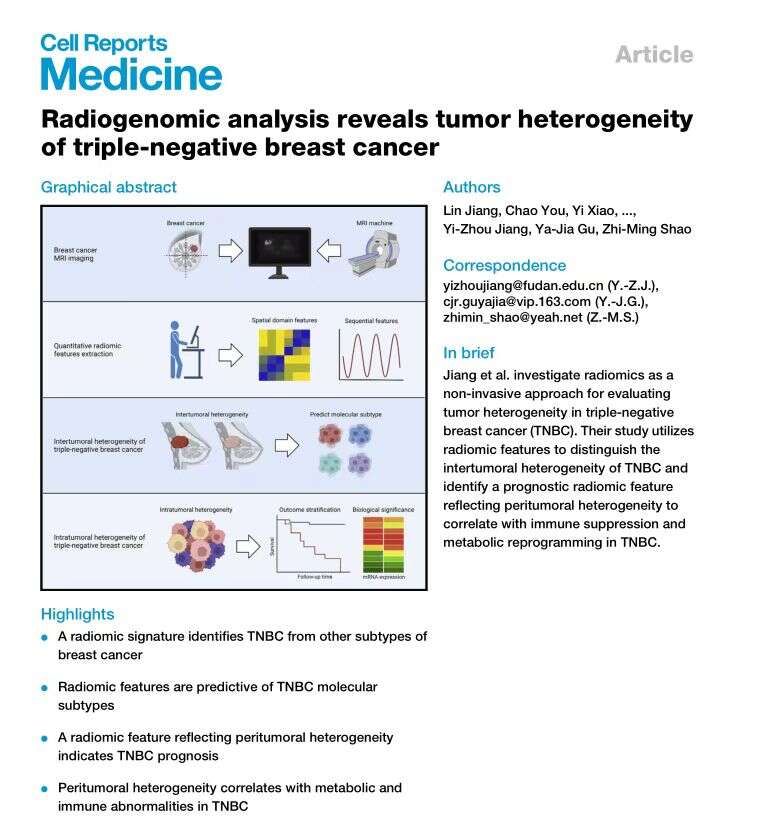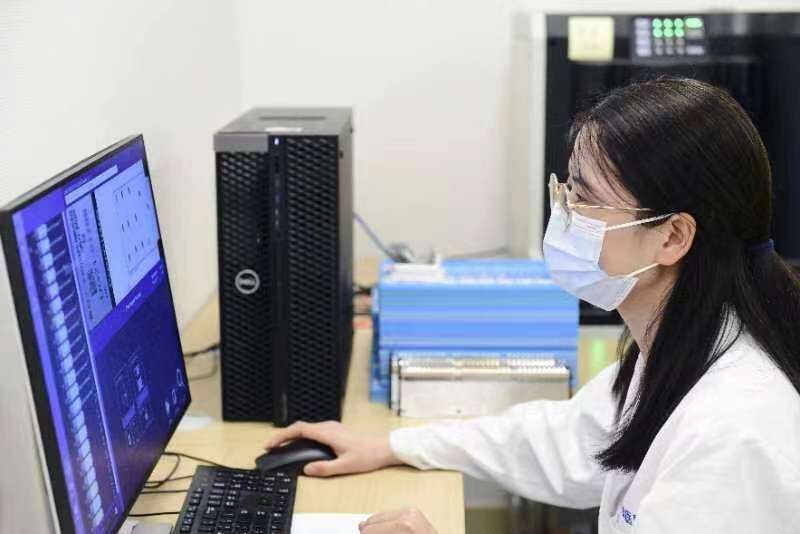China Youth Daily client, Shanghai, July 20 (China Youth Daily, China Youth Daily reporter Wang Yejie) Recently, the team of Professor Shao Zhimin, director of the Precision Oncology Center and director of breast surgery at Fudan University Affiliated Cancer Hospital, passed the The “Fudan Tumor” intelligent solution has been developed for the clinical diagnosis of triple-negative breast cancer by means of team combination + cross-regional medical-engineering collaboration. Today, the relevant research results were published online in Cell Reports Medicine, a journal of the American “Cell” magazine.

(The picture shows the online publication page of the paper, courtesy of Fudan Cancer Hospital)
The above-mentioned “intelligent solution” can solve the two diagnostic “pain points” of triple-negative breast cancer patients – biopsy has trauma, and there are many accurate diagnosis procedures.
Triple-negative breast cancer is a subtype of breast cancer. It has always been known as the “most toxic” breast cancer due to its high risk of recurrence and lack of effective therapeutic targets. Accurate identification of triple-negative breast cancer, its molecular typing and key gene mutations are of great value for subsequent precise treatment.
The “Fudan Classification” of triple-negative breast cancer proposed by Fudan Cancer Hospital in 2019 divides triple-negative breast cancer into 4 different subtypes, making it possible to precisely treat different subtypes. The identification of “Fudan typing” depends on accurate pathological diagnosis and genetic testing reports.
A pathological diagnosis and genetic testing report of triple-negative breast cancer usually needs to obtain tumor tissue through puncture or surgery, and can obtain it after a series of processing and testing. Can triple-negative breast cancer be identified by imaging data, so as to avoid the suffering of trauma? Or can the process and cost of accurate diagnosis be reduced to know the accurate typing of triple-negative breast cancer as soon as possible? Based on such clinical thinking, the breast surgery team of the Cancer Hospital, in conjunction with the hospital’s diagnostic radiology team and the pathology team, cooperated with the artificial intelligence technology team of the university, and with the help of advanced digital intelligence technology, tried to solve the two problems of accurate diagnosis of triple-negative breast cancer. a problem.

(The picture shows the team members doing data analysis, courtesy of Fudan Cancer Hospital)
The research results published this time illustrate the important clinical value of radiomics in suggesting tumor heterogeneity in triple-negative breast cancer. It is the first time to discover and confirm that radiomics can be used in triple-negative breast cancer without trauma before surgery. , Accurately predict its “Fudan classification”, and lay the foundation for subsequent precise treatment.
The reporter noticed that the “smart solution” is far more than imaging diagnosis. The research team also shortened the time for accurate diagnosis of triple-negative breast cancer to a few hours through a pathologically stained slice.
The team of Professor Zhimin Shao and the team of Professor Wentao Yang from the Cancer Hospital, together with the team of Professor Xu Jun from Nanjing University of Information Science and Technology, carried out a study on the prediction of molecular typing, key therapeutic targets and patient prognosis of triple-negative breast cancer based on digital pathology and deep learning, revealing that The important value of digital pathology combined with deep learning in predicting key biomarkers in triple-negative breast cancer. The results were published online in Basic Research, a journal under the National Natural Science Foundation of China.

(The picture shows the online publication page of the paper, courtesy of Fudan Cancer Hospital)
Based on this achievement, after the patient’s pathological biopsy, it is expected that only one pathological section can be used to quickly obtain the “Fudan typing”, key gene mutations and other key information related to treatment within a few hours, which can provide accurate treatment for follow-up. Great convenience.
It is reported that the aforementioned two studies were conducted by the Precision Oncology Center of the Cancer Hospital, the team of Professor Gu Yajia, director of the Department of Radiological Diagnosis, and the team of Professor Yang Wentao, deputy director of the Department of Pathology, and the team of Professor Wang He of the Institute of Brain-inspired Intelligence Science and Technology of Fudan University. . The typical results achieved by the team of Professor Xu Jun from Nanjing University of Information Science and Technology “Joining Medicine and Engineering” under the “Multidisciplinary + Medical-Engineering Intersection” model. Shao Zhimin introduced that the two research results are expected to be clinically applied and promoted in the Precision Oncology Center. In the future, the center will have more cross-professional and multi-disciplinary research results incubating, which will be further transformed into clinical applications.